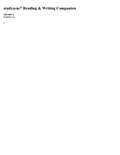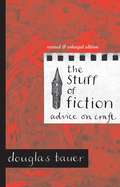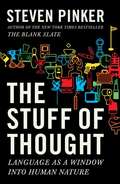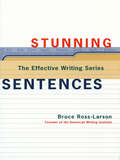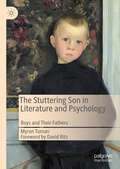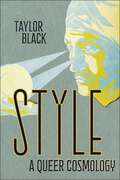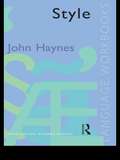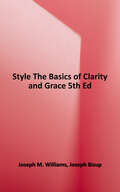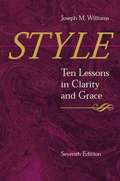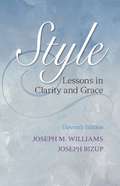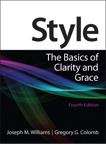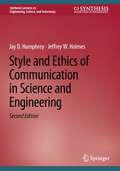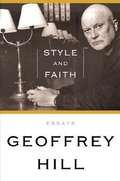- Table View
- List View
StudySync [Grade 8], Reading & Writing Companion [Unit 1]: Suspense!
by BookheadEd Learning LlcNIMAC-sourced textbook
StudySync [Grade 8], Reading & Writing Companion [Unit 2]: In Time of War
by StudySyncNIMAC-sourced textbook
StudySync [Grade 8], Reading & Writing Companion [Unit 3]: A Moral Compass
by StudySyncNIMAC-sourced textbook
StudySync [Grade 8], Reading & Writing Companion [Unit 4]: The Civil War
by StudySyncNIMAC-sourced textbook
StudySync, Grade 8, Reading & Writing Companion, Units [1–4]
by Bookheaded Learning LlcNIMAC-sourced textbook
StudySync Reading and Writing Companion Grade 6
by StudySyncStudySync Reading and Writing Companion
StudySync, Reading & Writing Companion: We the People, The Individual, Modern Times, Seeking Romance (Grade #Units 1-4)
by StudySyncStudySync®, Reading & Writing Companion, Grade 11, Unit 1: Breaking Away
by BookheadEd LearningNIMAC-sourced textbook
StudySync®, Reading & Writing Companion, Grade 6, Unit 1: Testing Our Limits
by BookheadEd LearningNIMAC-sourced textbook
StudySync, Reading & Writing Companion, Grade 7 Units [1-4]: In Pursuit, The Powers that Be, Justice Served, Getting Along
by BookheadEd LearningNIMAC-sourced textbook
StudySync, Reading & Writing Companion, Grade 8 Units [1-4]: Suspense! In Time of War, A Moral Compass, The Civil War
by BookheadEd LearningNIMAC-sourced textbook
The Stuff of Fiction: Advice on Craft
by Douglas BauerIn this book, prizewinning novelist and popular creative writing instructor Douglas Bauer (The Book of Famous Iowans) shares the secrets of his trade. Talent, as Bauer acknowledges, is the most crucial element for a writer and cannot be taught. But without a regular habit of work, and a perseverance of effort, no amount of talent can come forward and be recognized. His lively and candid essays on subjects critical to the fiction writer's success demystify the essential elements of fiction writing, how they work, and work together. Bauer's focus is on the building blocks of successful fiction: dialogue (the intimate relationship between characters talking and the eavesdropping reader), characters (the virtues of creating fictional characters that are both splendidly flawed and sympathetic), and dramatic events (ways to create moments that produce an emotional and psychological impact). There are also chapters on crafting effective openings and memorable closings of stories and on the vital presence of sentiment in fiction versus the ruinous effect of sentimentality. By assuming the point of view of someone at the task, engaged with the work, inside the effort to bring an invented world to life,The Stuff of Fictionspeaks to writers of all ages in a pleasurable yet practical voice. Douglas Baueris the author of three novels,Dexterity,The Very Air, andThe Book of Famous Iowans, and one book of nonfiction,Prairie City, Iowa. He is also a core faculty member with the MFA Program at Bennington College and has received a National Endowment for the Arts grant, a Massachusetts Artists Foundation grant, and two Harvard Danforth Excellence in Teaching Citations.
Stuff of Sleep and Dreams: Experiments in Literary Psychology
by Leon EdelA critical look at the psychological footprints of some authors. As well as a study of the psychological basis of the contradictory nature of authors and the characters they create, as when divorced from their craft.
The Stuff of Thought: Language as a Window into Human Nature
by Steven PinkerThe author explains how the mind works by examining the way we use words. Pinker takes on scientific questions - such as how language affects thought, and which of our concepts are innate - as well as questions from the headlines and everyday life.
Stunning Sentences (The Effective Writing Series)
by Bruce Ross-LarsonWhether you are composing a Web page on the Internet or agonizing over an annual budget report, these books are the key to clarity, accuracy, and economy in any writing task. Offers more than 100 model sentence types in a catalog format, giving writers many interesting and provocative ways to say what they mean. Writers looking for a more striking way to open a sentence will find these options: the announcement, the editorial opening, the opening appositive, the opening absolute, and the conjunction opening, among others. Examples of each sentence type ensure the reader's understanding of the concepts.
The Stuttering Son in Literature and Psychology: Boys and Their Fathers
by Myron TumanThe Stuttering Son: A Literary Study of Boys and Their Fathers examines stuttering, a condition which overwhelmingly affects boys, in terms of the complex relationships a number of male authors have had with their fathers. Most of these writers, from Cotton Mather to John Updike, were themselves stutterers; for two others, Melville and Kafka, the focus shifts to how similar family tensions contributed to their interest in the related condition of anorexia. A final section looks at the patricidal impulse lurking behind much of this analysis, as evident in Dostoyevsky, Shakespeare’s Hamlet, and Nietzsche. By focusing on the issue of a boy’s emotional development, this book attempts to re-establish the value of a broadly psychological approach to understanding stuttering.
Style: A Queer Cosmology (Postmillennial Pop #37)
by Taylor BlackAssembles texts, performances, and personae from American culture to assert the elemental natureof styleWhile “style” is equated with fashion or convention in common parlance, Style: A Queer Cosmology defines the term as a mode of expression that makes us more like ourselves and less like everyone else. Taylor Black’s interdisciplinary conceptual analysis assembles texts, performances, and personae from American culture that engage in ethical, creative, and performative modes of what he terms “abundant revelation.” Moving back and forth through time, this book sketches American cosmologies cultivated by iconic and subterranean American artists like Edgar Allan Poe, Flannery O’Connor, Nikki Giovanni, and Bob Dylan. Presiding throughout is the book’s conceptual guide: latter-day American and notorious homosexual Quentin Crisp, resurrected here as a philosopher of style.As a scholarly intervention, Style participates in the critical work of revival and attunement—revitalizing figures, terms, and ideas that have become too familiar. Returning to viewing the critic as a stylist, Style: A Queer Cosmology leans into the study of things and qualities that are immanent and elude paraphrase or social scientific categorization. Style is about the possible rather than the probable, singularity over universals, personality instead of identity, the emergent and not the new—the mystery of becoming.
Style (Language Workbooks)
by John HaynesIn Style, John Haynes provides a lively introduction to the study of expression in relation to meaning. Style: * introduces readers to the key areas in the study of style through practical exercises* encourages an interest in and sensitivity to words and structures* enables students to recognize contrasts within and between texts* heightens awareness with regards to word choice, meaning, communicative purpose and stylistic convention* examines an enormous variety of text-types; both literary and non-literary, spoken and written* in addition to numerous exercises, contains suggestions for project work.
Style: The Basics of Clarity and Grace
by Joseph Williams Joseph BizupStyle: The Basics of Clarity and Grace reflects the wisdom and clear authorial voice of Williams' best-selling book, Style: Lessons in Clarity and Grace, while streamlining every chapter to create a very brief, yet powerfully direct guide to writing with style. The concise clarity of this book makes it a handy reference for anyone interested in good writing--as well as a quick and ideal guide for freshman composition courses, writing courses across the disciplines, and as a supporting text in courses that require clear and direct writing. Style: The Basics covers the elemental principles of writing that will help students diagnose the strengths and weaknesses of their prose quickly and revise effectively. The text features principles of effective prose written in Williams' hallmark conversational style, offering reason-based principles, rather than hard and fast rules, for successful, effective writing.
Style: Lessons in Clarity and Grace Eleventh Edition
by Joseph M. Williams Joseph BizupWilliams' own clear, accessible style models the kind of writing that audiences-both in college and after-will admire. The principles offered here help writers understand what readers expect and encourage writers to revise to meet those expectations more effectively. This book is all you need to understand the principles of effective writing.
Style: The Basics of Clarity and Grace (4th Edition)
by Joseph M. Williams Gregory G. ColombStyle: The Basics of Clarity and Grace reflects the wisdom and clear authorial voice of Williams' best-selling book, Style: Lessons in Clarity and Grace, while streamlining every chapter to create a very brief, yet powerfully direct guide to writing with style. The concise clarity of this book makes it a handy reference for anyone interested in good writing.
Style and Ethics of Communication in Science and Engineering (Synthesis Lectures on Engineering, Science, and Technology)
by Jay D. Humphrey Jeffrey W. HolmesThis book serves as a valuable aid for scientists and engineers who seek to discover and disseminate knowledge so that it can be used to improve the human condition. This book can be used as a textbook for undergraduate or graduate courses on technical communication and ethics, a reference book for senior design courses, or a handbook for young investigators and beginning faculty members.In addition to presenting methods for writing clearly and concisely and improving oral or poster presentations, this compact book provides practical guidelines for preparing theses, dissertations, journal papers for publication, and proposals for research funding. Issues of authorship, peer review, plagiarism, recordkeeping, transparency, and copyright are addressed in detail, and case studies of research misconduct highlight the need for proactive attention to scientific integrity. Ample exercises cause the reader to stop and think. The authors motivate the reader to develop an effective, individual style of communication and a personal commitment to integrity, each of which are essential to success in the workplace.
Style and Faith
by Geoffrey HillSeven essays on the moral life of literature and the moral burden of the poet seek to rescue key literary works from misinterpretation, in a collection that covers such texts as the Oxford English Dictionary, Tyndale's Bible, and poems by Henry Vaughan and T.S. Eliot.

